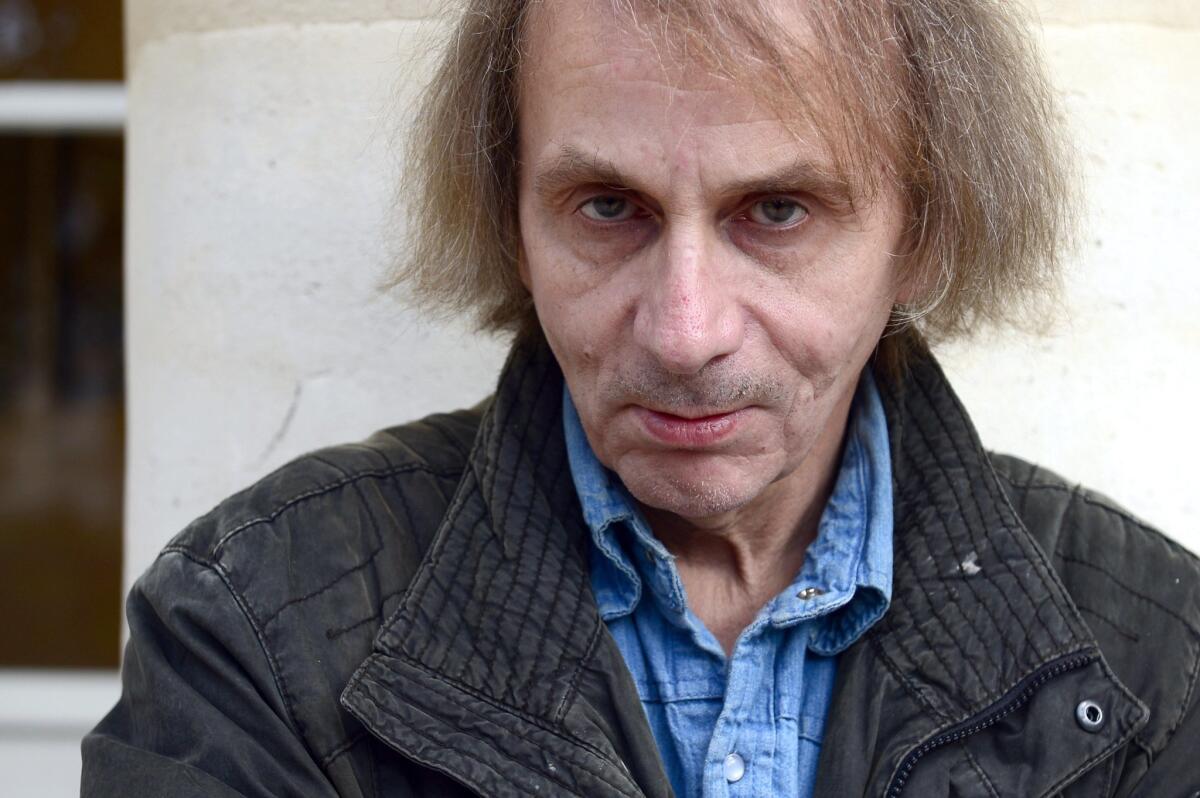Author Michel Houellebecq makes provocation an art

It’s hard to know with notorious French novelist Michel Houellebecq how much is provocation and how much is art. That, of course, is the whole point. Since the publication of his first novel “Whatever” in 1994, Houellebecq has consciously pushed the bounds of the acceptable, challenging us to see the hypocrisy of everything.
His sixth novel, “Soumission” (“Submission”), published Wednesday in Paris, involves the election -- in the year 2022 -- of a conservative Muslim to the presidency of France. A cartoon of Houellebecq was featured this week on the cover of the satirical newspaper Charlie Hebdo, which was attacked Wednesday by gunmen, leaving 12 people, including editors and illustrators, dead.
It is not yet clear whether the attack was connected to the current issue, which depicts Houellebecq in a wizard hat, saying (in French): “In 2015, I lose my teeth. In 2022, I do Ramadan.” Charlie Hebdo has made a point of taking on Islamic extremists; in 2006, it reprinted cartoons of Mohammed originally published in a Danish newspaper, and three years ago, produced a special issue called Charia Hebdo, after which its offices were firebombed.
Houellebecq appears to share some of these sensibilities; his 2001 novel “Platform,” which came out just before the Sept. 11 attacks in lower Manhattan and Washington, ends with a mass killing by turban-wearing terrorists. In its wake, reported the Guardian, Houellebecq called Islam “the most stupid religion” and said “that the ‘badly written’ Koran made him fall to the ground in despair.” Charged with provoking racial hatred, he was acquitted in 2002.
And yet, for all the troublesome aspects of such a posture, it may be more useful to think of Houellebecq as an equal opportunity provocateur. His books have been described (by no less a figure than Nobel laureate Mario Vargas Llosa) as “insolent” -- although it’s not hard to imagine that the Chilean writer is just the sort of establishment figure Houellebecq most means to disturb.
In a 1998 piece in the New Yorker, Adam Gopnick described Houellebecq’s literary intentions this way: “There are certain books -- sardonic and acutely pessimistic -- that systematically affront all our current habits of living, and treat our presumptions of mind as the delusions of the cretinous.”
The idea, in other words, is to make a mockery of our hypocrisies, to show us not as flawed but fatally self-deluded, the creators of a useless culture built on corrupt pieties.
“What I think, fundamentally,” he told the Paris Review in 2010, “is that you can’t do anything about major societal changes.... That’s the difference between me and a reactionary. I don’t have any interest in turning back the clock because I don’t believe it can be done. You can only observe and describe. I’ve always liked Balzac’s very insulting statement that the only purpose of the novel is to show the disasters produced by the changing of values.”
In “Submission,” these disasters have to do with the conflict between religious and secular values. “More and more people,” he told the Telegraph this week, before the attack on Charlie Hebdo, “can’t stand living without God.”
At the same time, he insists that “no novel ... has changed the course of history,” elaborating on a point he made in an earlier interview: “I am not taking sides, I don’t defend any regime. I deny any responsibility, I even claim total irresponsibility.”
This, I believe, is the issue in a nutshell, which is, of course, what all fundamentalists overlook. The responsibility of the artist, if we can even think in such terms, is to the art, if anything; it is to be willfully irresponsible. Art -- especially an art as scabrous as Houllebecq’s -- does not have to aspire to the moral, except on the most personal terms. To provoke, to shake us up, to challenge orthodoxies: this is a valid, and indeed essential, aesthetic point of view.
In Houellebecq’s breakthrough novel “The Elementary Particles,” published in the U.S. in 2000, a character writes a racist tract. “You might have got away with it in Céline’s day,” he is told. “These days, there are some subjects about which you can’t just write anything you feel like.” Like Céline before him, Houellebecq rejects that way of thinking as inimical to the necessities of his work.
Like him or hate him -- and, I should admit here, I’m not a fan of either his politics or his tendency to rely on provocation for its own sake -- his writing is built on the difficult faith that literature is not meant to cosset us, but rather to tear us apart.
More to Read
Sign up for our Book Club newsletter
Get the latest news, events and more from the Los Angeles Times Book Club, and help us get L.A. reading and talking.
You may occasionally receive promotional content from the Los Angeles Times.







